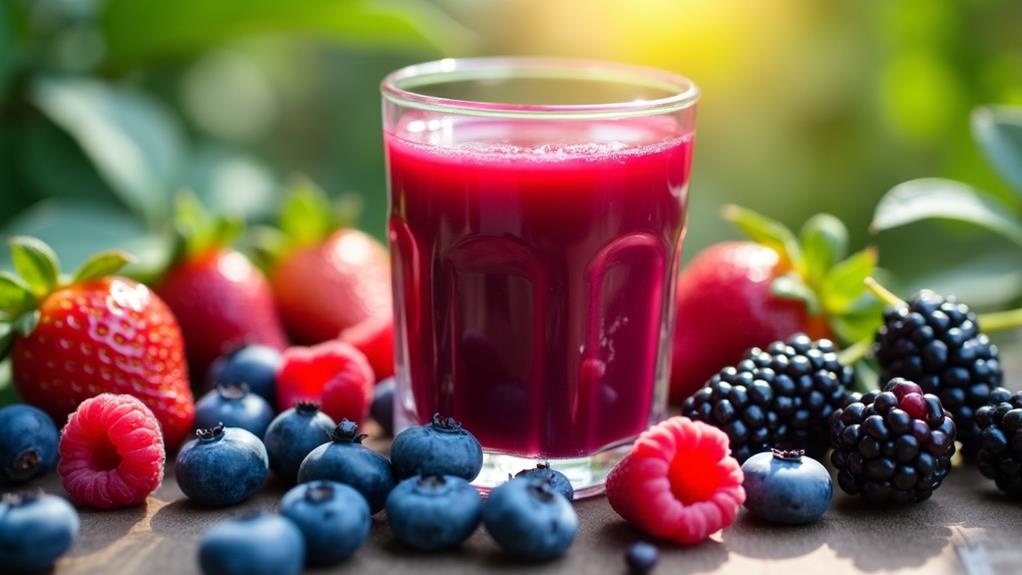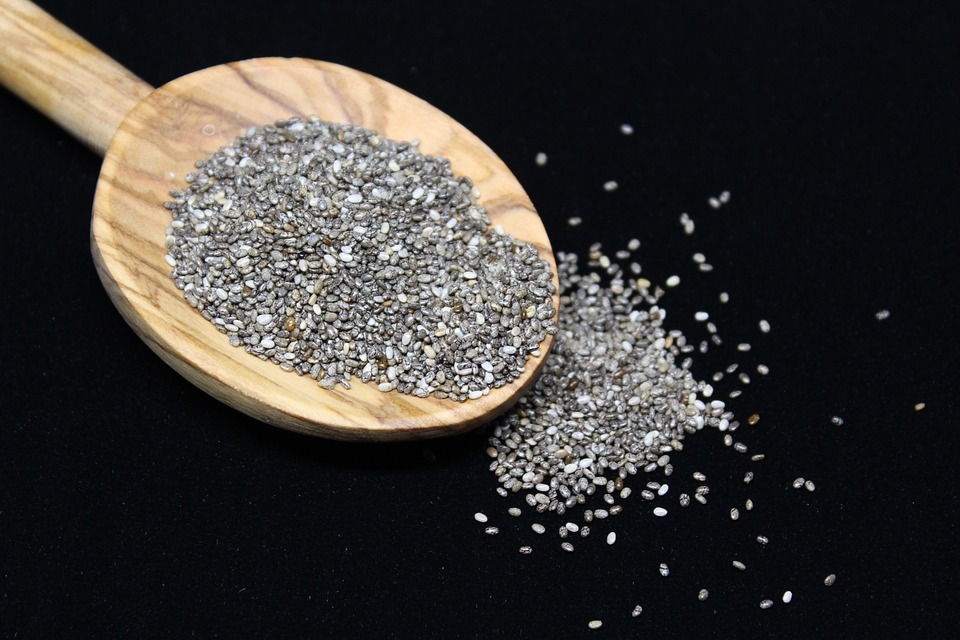Citrus Juice: Health Benefits and Nutritional Insights

Incorporating citrus juice into your diet offers more than just a refreshing taste. Citrus juices, such as orange and grapefruit, are rich in vitamin C, which bolsters your immune system and aids digestion. Additionally, they contain antioxidants and flavonoids that can improve heart health by managing blood pressure and cholesterol levels. However, be mindful of their acidity and potential interactions with certain medications. Balancing these benefits while mitigating risks requires a thoughtful approach. Let's explore this further.
Nutritional Profile
When you pour a glass of citrus juice, you're not just enjoying a refreshing drink; you're also accessing a potent source of nutrients. Citrus fruits like oranges and grapefruits boast an impressive nutritional profile. A six-ounce serving of orange juice provides over 100% of your daily vitamin C needs, essential for collagen synthesis and overall health.
But vitamin C is just the beginning. Citrus juices also offer dietary fiber. Although a cup of orange juice contains about 1 gram of fiber, it still contributes to digestion and cholesterol management. Additionally, these juices are low in calories—only around 110 for an eight-ounce serving—making them a smart option if you're monitoring your weight.
Citrus juices are also rich in potassium, an essential mineral for heart health and muscle function. For instance, grapefruit juice provides about 10% of your daily potassium needs. Furthermore, with their high water content—approximately 90%—citrus juices significantly contribute to your daily hydration. Thus, every sip not only refreshes you but also supports various aspects of your health, making citrus juice a valuable addition to your diet.
Immune System Support
Citrus juice offers significant benefits for your immune system, thanks to its rich nutritional profile. A six-ounce serving of orange juice provides 103% of your daily vitamin C needs, essential for a robust immune system to fend off illnesses and infections.
Citrus fruits are also rich in antioxidants like flavonoids and carotenoids, which combat oxidative stress and support immune function. By reducing oxidative stress, these antioxidants help your immune system operate more effectively.
Regular consumption of citrus juice may reduce the duration and severity of colds, making it a valuable ally during cold and flu season. Additionally, the high water content in citrus juices aids in hydration, essential for maintaining a strong immune system. Proper hydration helps flush out toxins and supports overall well-being.
Moreover, vitamin C in citrus fruits supports collagen synthesis, crucial for skin health. Healthy skin acts as a barrier against pathogens, further enhancing your immune defense. So, enjoy citrus juice to boost your immune health!
Heart Health Benefits

Regularly consuming citrus fruits offers heart health benefits due to their high flavonoid content, which helps lower blood pressure. These fruits also aid in cholesterol management by decreasing LDL levels and increasing HDL levels, thereby reducing the risk of heart disease. Additionally, the antioxidants in citrus fruits combat oxidative stress, providing further protection to the cardiovascular system.
Flavonoid Cardiovascular Protection
Citrus fruits are rich in flavonoids that can significantly enhance cardiovascular health. These natural compounds, found in abundance in oranges and grapefruits, play a crucial role in improving heart health. Regular consumption of citrus fruits equips your body with the means to lower systolic blood pressure and reduce LDL cholesterol levels. Flavonoids act as antioxidants, mitigating oxidative stress, a key factor in heart disease.
One particularly effective flavonoid, naringenin, is found in grapefruit. It not only improves lipid profiles but also serves as a potent antioxidant, offering protective benefits against heart disease. Research indicates that individuals who consume higher amounts of citrus fruits have a significantly lower risk of cardiovascular mortality. This underscores the profound impact these fruits can have on your cardiovascular well-being.
Cholesterol Reduction Mechanisms
Citrus fruits play a significant role in promoting heart health by reducing cholesterol levels. These fruits, especially oranges and grapefruits, contain flavonoids such as hesperidin and naringenin, which help lower LDL cholesterol (often referred to as "bad" cholesterol) and raise HDL cholesterol (the "good" cholesterol). This balance is crucial for cardiovascular health.
Additionally, citrus fruits are high in soluble fiber that binds to bile acids in the digestive system. This binding promotes the excretion of bile acids and reduces overall cholesterol levels in the bloodstream.
Consuming citrus juices, particularly grapefruit juice, has been shown to contribute to cholesterol reduction. Research indicates that individuals who drink grapefruit juice daily can experience a significant drop in total cholesterol levels, emphasizing the beneficial impact of citrus fruits on heart health.
Moreover, the antioxidant properties of vitamin C found in citrus fruits help mitigate oxidative stress and inflammation, both pivotal in the development of heart disease and high cholesterol levels.
| Citrus Component | Heart Health Benefit |
|---|---|
| Flavonoids | Lower LDL, raise HDL |
| Soluble Fiber | Binds bile acids, reduces cholesterol |
| Vitamin C | Reduces oxidative stress and inflammation |
Including citrus fruits in your diet can be an effective strategy to manage cholesterol levels and support overall cardiovascular health.
Blood Pressure Regulation
Citrus fruits, particularly grapefruit, play a crucial role in regulating blood pressure and enhancing heart health. Regular consumption of these fruits is associated with decreased systolic blood pressure, contributing positively to cardiovascular health. This benefit is largely due to the presence of flavonoids like hesperidin, which reduce inflammation and improve blood vessel function, directly aiding in lowering blood pressure.
A study has shown that individuals who consume citrus fruits daily experience a noticeable drop in blood pressure compared to those with lower intake. This effect can be attributed to the high potassium content in citrus fruits, which helps balance the effects of sodium in the body, thereby regulating blood pressure.
Additionally, research suggests that a diet rich in citrus juice is linked to lower rates of heart disease and stroke. Increased citrus intake is closely associated with improved cardiovascular outcomes. By incorporating citrus fruits into your diet, you are making a significant step towards better heart health and overall well-being.
Weight Management
Incorporating citrus fruits like oranges and grapefruits into your diet can significantly aid in weight management. These fruits are low in calories, with a medium orange containing just 62 calories, making them an excellent choice for those looking to manage their weight. Additionally, their high water content (about 87% in oranges) helps you feel full, reducing overall calorie intake.
Here's why citrus fruits can support weight management:
- Low Calories: Citrus fruits are naturally low in calories, making them a great snack option.
- Dietary Fiber: One cup of orange segments provides about 4 grams of dietary fiber, aiding digestion and promoting satiety.
- Low Glycemic Index: Citrus fruits have a low glycemic index, releasing sugar slowly into your bloodstream, which helps maintain stable energy levels and prevent cravings.
- Metabolism Boost: Regular consumption of citrus, especially grapefruit, has been linked to increased metabolism and fat loss.
Fiber Content

Citrus fruits are an excellent source of dietary fiber, with one cup of orange segments providing approximately 4 grams. This fiber is predominantly soluble, especially pectin, which can help lower cholesterol levels and improve heart health. Including citrus fruits in your diet can help you approach the recommended daily fiber intake of around 28 grams.
Fiber Content in Citrus Fruits
| Citrus Fruit | Fiber Content (per cup) |
|---|---|
| Orange segments | 4 grams |
| Grapefruit segments | 4 grams |
| Tangerine segments | 3 grams |
| Lemon wedges | 2 grams |
| Lime wedges | 2 grams |
Soluble fiber aids in cholesterol management and supports weight control by promoting a feeling of fullness. The high water content in citrus fruits, combined with their fiber, enhances satiety, making it easier to manage weight and avoid overeating.
Additionally, high fiber intake from citrus fruits benefits digestive health by regulating bowel movements and preventing constipation. Therefore, incorporating citrus fruits into your regular diet can improve heart health, aid in weight management, and support overall digestive well-being.
Dental Considerations
When consuming citrus juices, be mindful of their high acidity, which can erode tooth enamel and elevate the risk of cavities. To protect your teeth, drink these juices in moderation and use a straw to limit contact with your enamel. Additionally, rinsing your mouth with water afterward can help neutralize the acids and protect your dental health.
Acid Erosion Risks
Understanding the potential for acid erosion is crucial when evaluating the dental impacts of citrus juice consumption. Citrus juices, such as those from lemons and grapefruits, are highly acidic, with pH levels ranging from 2 to 3. Frequent consumption can lead to enamel erosion, posing a significant risk to dental health, especially if consumed throughout the day.
Here are some key points to consider:
- Acid Erosion: Prolonged exposure to acidic beverages can wear down dental enamel, increasing the risk of cavities and tooth sensitivity.
- Dental Health: Regular consumption of citrus juices can weaken the enamel that protects your teeth, leading to potential dental issues.
- Enamel Erosion: The strong acidity in these juices can cause enamel erosion over time if not managed properly.
- Acidity: High acidity levels in citrus juices are detrimental to dental enamel, making preventive measures essential.
If you have acid sensitivity, it's advisable to limit your intake of citrus juices to avoid dental erosion and related issues. To minimize the risk, use a straw to drink citrus juices and rinse your mouth with water afterward to neutralize the acidity.
Enamel Protection Tips
Protecting your enamel from the acid in citrus juices is crucial for maintaining dental health. High acidity, particularly in lemon juice, can lead to enamel erosion, increasing the risk of cavities and sensitivity. To minimize enamel erosion, drink citrus juices through a straw. This reduces direct contact between the juice and your teeth. After consuming citrus beverages, rinse your mouth with water to neutralize acids and reduce potential harm to your enamel.
Chewing sugar-free gum after drinking citrus juices can also help. It stimulates saliva production, which plays a significant role in protecting and remineralizing your enamel. Additionally, limit the frequency of citrus juice consumption throughout the day. Prolonged exposure to acids is more damaging than occasional intake, so enjoy these juices in moderation.
Medication Interactions

Many people are unaware that grapefruit can interfere with the absorption of certain medications due to a compound called furanocoumarin. This compound inhibits an enzyme in your gut responsible for drug metabolism, leading to increased absorption of affected drugs. Such interactions can result in adverse effects and even toxicity, particularly with some statins like Lipitor and Zocor, calcium channel blockers, and certain antidepressants.
To stay safe, it's essential to understand the potential risks of consuming grapefruit if you're on these medications. Here are some key points to consider:
- Drug Efficacy: Grapefruit can alter how well your medication works, potentially reducing its effectiveness.
- Adverse Effects: Increased absorption can lead to serious side effects, making it crucial to monitor your intake.
- Consult Your Doctor: Always discuss with your healthcare provider before adding grapefruit to your diet if you're on medication.
- Safer Alternatives: Other citrus fruits like lemons and oranges don't have the same level of interactions, making them better choices.
Understanding these factors will help you enjoy the health benefits of citrus fruits while avoiding potentially dangerous interactions.
Consumption Tips
When enjoying citrus juices, opt for whole fruits to gain more fiber and reduce sugar intake. Whole citrus fruits like oranges provide 3.1 grams of fiber per serving, aiding digestion and helping to control sugar consumption. Additionally, whole fruits are lower in calories; a medium orange has just 62 calories, compared to a cup of orange juice which has around 112 calories with minimal fiber.
Limit your juice intake to 4-6 ounces per day to avoid excessive sugar and calorie consumption. Many fruit juices are high in fructose, which can contribute to weight gain and other health issues if consumed in large quantities. Enhance your meals with a splash of citrus juice for added flavor and vitamins without making it your primary beverage.
Be cautious with grapefruit juice, as it can interfere with the absorption of certain medications, potentially increasing side effects and toxicity. To protect your dental health, drink citrus juices with a straw and rinse your mouth with water afterward to minimize acid exposure and prevent tooth enamel erosion. Following these tips can help you enjoy the benefits of citrus fruits while managing your sugar intake.




